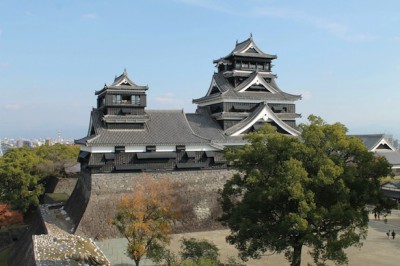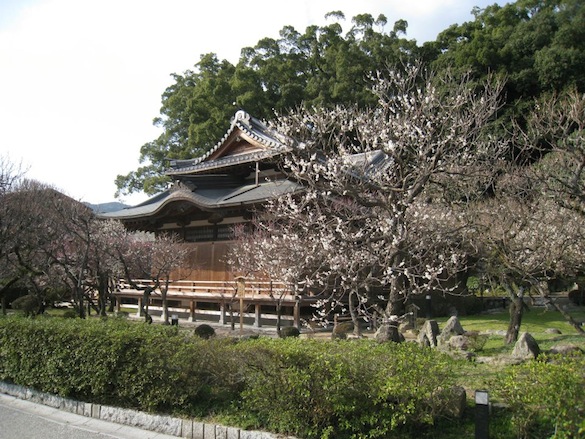FUKUOKA, JAPAN. If you find yourself in Fukuoka, the northern capital of Kyushu island (one of Japan’s four main islands) you will find a quiet and convenient city that is the gateway to the rest of Japan. Fukuoka city (Fukuoka-shi) can be divided into two spheres: Hakata and Tenjin. Tenjin is the bigger and livelier CBD with an abundance of shopping, restaurants and izakaya (bars). From Tenjin you can travel south through Fukuoka prefecture.
Hakata is the main Japan Railways (JR) station and the link to the rest of Japan. From Hakata you can take the Shinkansen all the way north-east to Tokyo or all the way south to Kagoshima. At Hakata port you can take the boat to South Korea (Pusan) in a couple of hours, and Fukuoka airport connects Fukuoka to the rest of Japan and much of Asia. The great thing about Fukuoka is that everything within the metropolitan area is easily accessible by bus or train (overland or subway) or by foot.
If you are interested in castles (jō), Kyushu is a great island to visit. Fukuoka-jō may be a ruin, but it is an interesting site to visit and offers a great view of the surrounding city and neighbouring Ohori Park. In the spring (March-May) the castle site is awash with colour as blossoms from cherry (sakura) and plum (ume) trees bloom. If you head north on the Shinkansen from Hakata, you will be in Kokura, where you can visit Kokura jō. It’s a cute little castle nestled in the heart of the CBD overlooking a shopping district and river.
If you head south on the Shinkansen from Hakata, you will be in Kumamoto, and the formidable Kumamoto-jō. This castle was a principal site in the Satsuma Rebellion during the Japanese civil war between the Meiji government and the last of the samurai who struggled to keep the old ways. It has been converted into a museum but is a fantastic sight to behold.
If you are interested in Japanese temples, then there is no shortage around Fukuoka. The most popular temple is Dazaifu Tenmangu, a Shinto temple in the heart of Dazaifu-city. Dazaifu can be reached using the Nishitetsu line from Tenjin and is about a 30minute ride on a local train. In the heart of the country side, surrounded by mountains, Dazaifu Tenmangu has sprawling gardens and many small shrines and tea houses dotted around the grounds. The main street outside the train station has stores selling souvenirs and food.
Behind Dazaifu Tenmangu is Mount Homan, a hiking trail up the mountain. It’s a good adventure hike, suitable for all ages (just be sure to wear appropriate clothes) and you’ll be travelling through beautiful forest.
If you are in Fukuoka for the food, there is definitely no shortage of that. Between Hakata and Tenjin you’ll be able to sample all of the best food Fukuoka has to offer and some standard Japanese fare. Local specialties are mentaiko (marinated cod roe) and tonkotsu (pork bone) ramen. Don’t let the name frighten you, it is a delicious dish that warms you up in the cooler weather. Adventurous types can try ramen in the many Yatai that spring up around the city at night, but be warned that some may not have the best conditions. For a safer bet, it’s better to find a nice ramen restaurant or izakaya and enjoy tonkotsu ramen with a frosty beer and side serve of gyoza (dumplings)!
For gamers and electronic enthusiasts, Fukuoka has all the same charms that you would find in Akihabara in Tokyo. Actually, living in Japan takes away some of the glitz of Akihabara’s range of electronic and nerdy fare.
For up-to-date games, in Hakata is the four floor Yodobashi camera, with all your electronic needs and a food court. In Tenjin there are two main Bic Camera stores and several smaller versions dotted around on corners (usually serving as photo hubs). For retro gamers and collectible fans, Mandarake (not Mandrake as it is commonly called) and Book Off in Tenjin are where a huge selection of games can be found for a bargain (Book Off) or at more expensive collector’s prices (Mandarake). They of course, also sell newer titles too.
Fukuoka presents a more manageable Japanese city for tourists, it’s easy to get around, the people are friendly, and the food and shopping are great. There’s a long history there and a lot of culture to sample, and it’s not so far away from the rest of the country and its spectacles! If you have the chance, it’s well worth the time to visit Fukuoka!


